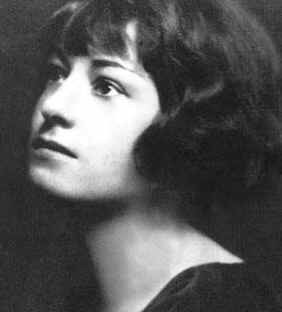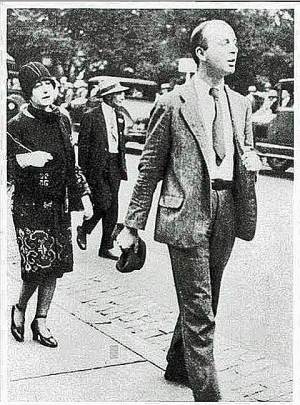
Dorothy Parker is famous for her poetry and her wit, but not so much for being kickass. In fact, her public and private persona depended on her being perceived as permanently heartbroken, a romantic and creative underdog. However, Dorothy became involved in activism as the 1920s drew to a close, and deserves to be remembered for her activism as well as her wisecracks.
Dorothy was born in 1893. Her mother died when she was five, and Dorothy disliked her  stepmother. She was half Jewish (her father, Jacob Henry Rothschild, was the son of Jewish immigrants from Prussia). For much of her life Dorothy struggled with internalized anti-Semitism. This was common among her peers, until the overt anti-Semitism of the Nazis caused Dorothy and many of her friends to become active in fighting anti-Semitism at home and abroad.
stepmother. She was half Jewish (her father, Jacob Henry Rothschild, was the son of Jewish immigrants from Prussia). For much of her life Dorothy struggled with internalized anti-Semitism. This was common among her peers, until the overt anti-Semitism of the Nazis caused Dorothy and many of her friends to become active in fighting anti-Semitism at home and abroad.
During Dorothy’s early career in New York, activism was far from her mind. Dorothy moved to New York City as a young adult and found work at Vogue. She married Eddie Parker, who promptly left for WWI. When he came back, he was deeply changed by his war time experiences and developed addictions to alcohol and morphine. They divorced. Dorothy moved on to Vanity Fair and then to freelance writing, including publishing poems, essays, short stories, and criticism in the brand-new New Yorker Magazine.
By that time, Dorothy was a member of the Algonquin Round Table. I use the term “member” loosely, because the Round Table had no fixed or official membership or official beginning and ending date. It was simply the name given to a group of writers, artists, and actors who met at the Algonquin Hotel daily for lunch, from about 1919 to 1929. This group was famous for quick wit and none more famous than Dorothy.
The year 1927 saw protests around the world on behalf of two Italian immigrants, Nicola Sacco and Bartolomeo Vanzetti. They were accused of murder and armed robbery, and were condemned largely because they were anarchists. Dorothy was deeply disturbed by their case. She participated in a protest march in Boston. A crowd jeered at the marchers and Dorothy, who did not want to ride in the “paddy wagon,” was manhandled by police. Dorothy was arrested for “loitering and sauntering,” about which she said, “Well, I did saunter.”

After this point, Dorothy considered herself to be a socialist, a claim with serious consequences. She drifted away from the Round Table, impatient with the members’ dismissal of politics. She traveled to Spain to report from the Spanish Civil War and spoke at public events on behalf of several anti-fascist organizations in the US. She was a vocal and active member of the Hollywood Anti-Nazi League which was founded in 1936 in response to Adolf Hitler’s rise to power in Germany. She also co-founded the Screen Writers’ Guild. Dorothy’s activism took the form of monetary donations, speaking at events, and writing, especially in her short stories that skewered hypocritical and indifferent attitudes.
After the war, Dorothy was investigated by the FBI and blacklisted by the House of Un-American Activities. She and her second (and, because by then they had divorced and remarried, also third) husband, who was also blacklisted, left Hollywood and returned to New York City.
In her will, Dorothy left her estate to Martin Luther King Jr., and when he died the estate went to the NAACP (as specified by her will). The NAACP still receives royalties from her work.
After her visit to Spain, Dorothy wrote the following:
I heard someone say, and so I said it too, that ridicule is the most effective weapon. I don’t suppose I ever really believed it, but it was easy and comforting, and so I said it. Well, now I know. I know that there are things that never have been funny, and never will be. And I know that ridicule may be a shield, but it is not a weapon.
I think that ridicule is an excellent weapon. However, what I think Dorothy was saying was that it’s not enough to sit around and be witty. Most of the people who were associated with the Algonquin Round Table disliked politics and avoided serious topics. Dorothy deserves to be remembered as one who quite literally got out of her chair and got to work on the broader issues in the world.


Thanks for this one (and all of them, of course!)
I’m still thankful for the high school English teacher who said, essentially, “Hey you, sarcastic teenage misanthrope, check this stuff out.” It was indeed a good fit, Ms. ______.
I was absolutely crazy about her writing when I was in college-to the extent that I wrote a biography of her for one of my classes. Thanks for this!
If you’re into podcasts, The History Chicks did a 2-parter on her, so fascinating!
The You Must Remember This episode on her is also worth a listen. In fact, that whole series on episodes on the black list is enlightening.
And she was one of the original writers of A Star is Born too! God I love her so much.
I stayed at the Iroquois in NYC for business once and had to stop in at the nearby Algonquin, just because. Robert Benchley was another favorite of mine from that incredible group. I’m kind of amazed at the authors I read as a teen. Thanks for Dorothy Parker.
I had no idea she left her estate to MLKJr and subsequently the NAACP!
“If you don’t have anything nice to say, come sit by me.”
One of my all-time favorite Dorothy Parker bon mots.
I love her! I first read about her in an It Girl novel and it got me interested me in her work. She was fascinating.
All too often it’s her cheeky wit that gets all the attention. This is a great and well balanced post. Thanks.
If you’re in NYC, visit the bar at the Algonquin Hotel and ask to sit at the round table under the portrait of the “vicious circle.” My husband and I did that a couple of years ago. We got Brandy Alexanders in honor of Dorothy & friends. A favorite Big Apple vacation moment!
I always loved her wit, but never realized the extent of her activism!
Beautiful, thank you.
I’ve seen the “if you don’t have something nice to say” quote attributed to Alice Roosevelt (supposedly she had it embroidered on a pillow), but I don’t know who said it first.
We absolutely CANNOT forget her glorious time as the Constant Reader, her book and play reviewer moniker for I believe the New Yorker, who was gloriously and utterly snarky and was not afraid to rip apart a lousy story when she saw it.
If you get a chance, watch “Mrs. Parker and the Vicious Circle,” released in 1994, which is a tribute to the Algonquin Round Table. In the movie, she looks back at her early days and Jennifer Jason Leigh does a creditable job as Dorothy Parker, delivering so many of her famous lines as you expect the author would have. She was also a college favorite of mine, especially her quotes about writing. A favorite: “I hate writing, I love having written.”